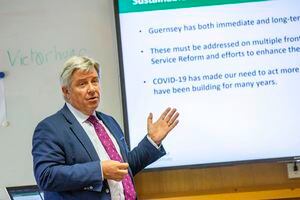Tax rises proposed – it's GST or 3% for 'health'
PLANS to introduce either a goods and services tax of up to 8% or an income-based 3% ‘health tax’ have been announced, alongside a warning that failure to act could lead to permanent damage to the island’s economy.

Unveiling the proposals, Mark Helyar, the treasury lead for Policy & Resources, said the States had almost no choice if they wanted to maintain the current level of public services.
‘The chickens have come home to roost,’ he said.
‘This is the first time historically that we’ve been in this position where we’ve literally got to the end of the runway.
‘We’re running out of surplus because the services we’ve decided to provide, like Nice drugs for example, are going to erode that surplus and will leave us not enough money to pay for capital and other things.
‘The car has run out of petrol and there is no spare can in the boot’
Three options will be put to States members in September, although deputies will only be asked to agree a direction before more detailed proposals are drawn up.
The first option is for an income-based health tax at 3%.
The second is for a GST that will gradually increase up to 8%, with mitigating measures to assist people on low incomes.
Option three is seen as the compromise because it includes a GST phased up to 5%, but with smaller mitigating measures.
At this stage the idea is that Guernsey’s GST would have no exemptions, so food, children’s clothes, books, public transport and tampons would be included.
The earliest date for introducing a GST would be 2024, and the projections are that it would raise between £70m. and £75m. per year.
Increasing the personal income tax allowance, the States pension, and income support, and overhauling the social security contribution system are the suggested ways to alleviate the impact of GST on low income households.
Policy & Resources has not decided yet which option it prefers, but Deputy Helyar said his personal preference was for option three, with 5% GST, because it was the ‘least worst’.
Covid-19 has exacerbated the position of the island’s public finances, but the tax review found that even before the pandemic there were serious underlying fiscal structural problems, the most significant relating to the ageing demographic and the upcoming boom in the number of people aged over 85.
A wealth tax was ruled out by the review because the island’s richest 5% already pay 26% of the tax take, and there were fears that these high earners could be chased away if they were pushed for more.
Corporate taxes are being reviewed separately because the OECD has not published its tax proposals yet, but the assumption is that corporate taxes will also go up and generate an extra £10m. per year.





